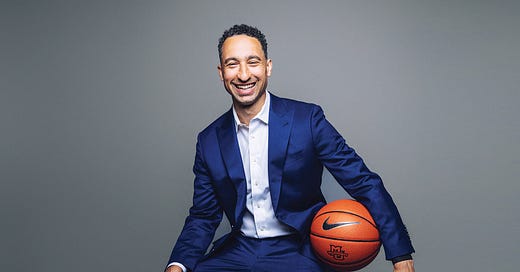Facing PTSD: Coaching Through the Unseen Scars of Youth Sports
Elevate your team's potential through learning how to be aware of trauma with your athletes. Expert advice, practical strategies, and inspiring stories delivered to your inbox. Free!
The Opening Line from Jim and Jason
Encouragement and perspective for PTSD Awareness Month.A Message from Matt Brandmeyer
Founder of Structured Support and Licensed TherapistChampions of Change: Shaka Smart – Coaching the Heart Before the Player
What the Marquette coach can teach us about coaching the person before the player.In the spotlight: PTSD Awareness – The Unseen Game on Your Team
PTSD among athletes and how coaches are uniquely positioned to help.The Reality Check: The Lingering Shadows of Untreated Trauma
It’s time to confront a deeper truth about the mental health crisis we're witnessing in youth sports.The Deep Dive: Unpacking Trauma's Bio-Psycho-Socio Roots
Unpacking the cultural, family, and systemic forces affecting our athletes.The Toolbox: Your 2-Minute Connection
One simple shift that can make a world of difference.Game-Changing Quote
This week’s wisdom from Rocky Balboa.The Joy of the Game
The pressure of the handshake is real…Partner Spotlight – BMS Project
The Opening Line From Jim and Jason
Coaches,
You carry more than a clipboard. You carry the weight of kids’ futures and sometimes their pasts too. This June, as we shine a light on PTSD Awareness, we want to acknowledge the incredible dedication you bring to your role. You are more than coaches; you are mentors and role models. Often, you are a lifeline for young athletes navigating the intense pressures of youth sports.
We understand the unique challenges you face: the long hours, the emotional investment, and the immense responsibility for these young lives. But your influence extends far beyond the win-loss column. You have the power to instill invaluable life skills.
Despite massive investments in youth sports, mental health challenges are unfortunately on the rise. This paradox highlights an unseen battle our young leaders are fighting. This month, we're focusing on trauma – a critical aspect of mental health that impacts our athletes.
Remember, the most effective coaches prioritize making the people around them better. Let’s use this month as a reminder to:
Be present: Listen for subtle cues, knowing unseen struggles, like trauma, can impact performance and behavior.
Be understanding: Recognize that past difficult experiences might manifest in unexpected ways, fostering an environment of support, not judgment.
Be empowering: Guide athletes to build mental fortitude and emotional resilience, turning challenges into opportunities for profound growth.
Your commitment to their holistic development shapes not only their athletic careers but their entire lives.
Thank you for being the leaders our athletes truly need.
Sincerely,
Jason and Jim
A Special Message from Matt Brandmeyer from Structured Support!
This month, we're honored to shine a spotlight on Matt Brandmeyer, a visionary leader whose work at Structured Support deeply resonates with our mission at 4D Leaders. Matt's insights are invaluable for coaches striving to develop holistic leaders, especially in navigating the complex emotional landscape of youth sports today. He champions the idea that coaches play a crucial role in helping players process and build resilience from trauma. His approach emphasizes creating supportive environments and understanding that difficult experiences, when properly addressed, can become catalysts for profound growth – transforming adversity into an opportunity for athletes to become stronger, more confident individuals both in sports and in life. You can learn more about Matt and his work by clicking here.
“At first, I coached for control. Now, I coach for connection.”
– Shaka Smart
Shaka Smart is one of the most respected coaches in college basketball, not just for his success on the court, but for how he evolved off it. Early in his career, Smart was known for his relentless, high-pressure “Havoc” style and intensity. But behind the energy was a coach who hadn’t yet understood the emotional needs of his players.
That changed when he realized many of the athletes he was recruiting and coaching were carrying unseen emotional wounds from poverty, violence, broken homes, or personal loss.
Smart began to shift his coaching philosophy from demanding effort through intensity to drawing it out through trust, love, and understanding. He started asking deeper questions, checking in with players not just on their game, but on their life.
In one interview, Smart said:
“Some of these guys have been through more trauma by 18 than I have in my entire life. If I don’t understand where they’re coming from, how can I expect to get the best out of them?”
He implemented daily connection practices, where he made it a point to talk to each player about something unrelated to basketball. He also emphasized emotional safety and leadership development, bringing in psychologists, mindset coaches, and even yoga and mindfulness to help players self-regulate.
The result? His teams still play hard—but they play with joy, unity, and trust. At Marquette, he’s not just building winning teams—he’s building young men who can handle adversity with strength and compassion.
In the spotlight: PTSD Awareness – The Unseen Game on Your Team
Let's talk about that kid on your team who just... isn't quite right. Maybe they’re usually stellar but suddenly struggle with focus in clutch moments. Or perhaps a player, typically even-keeled, melts down over a minor mistake, or becomes withdrawn and quiet. We might label these as "attitude problems" or "a bad day." But what if it's something deeper? An unseen battle playing out beneath the surface?
This June, for PTSD Awareness Month, I want to shed light on how trauma can quietly impact the young athletes you lead.
What is Trauma (Beyond the Obvious)? When I talk about trauma, I'm not just referring to major, dramatic events like natural disasters or severe accidents. Trauma can also stem from:
Persistent stress: Things like chronic instability at home.
Emotional experiences: Bullying, a perceived constant lack of safety, or even a series of seemingly smaller, distressing experiences that overwhelm a child’s capacity to cope.
How Trauma Shows Up on Your Team: These experiences aren't always obvious, but they manifest in ways that impact both their performance and behavior:
Emotional & Mental Strain: Increased anxiety, emotional dysregulation, or unexplained apathy.
Focus Issues: Difficulty with concentration, decision-making.
Social Challenges: Withdrawal or sudden emotional outbursts.
Why This Matters (A Critical Insight): Crucially, many of these traumas often go untreated, sometimes for years, profoundly shaping an individual’s responses to stress and pressure. What’s even more insightful is that trauma can be passed down through generations—a concept rooted in Family Systems Theory, where patterns of behavior and emotional responses can be transmitted across family units. These unseen burdens directly impact the "Heart" and "Mind" aspects of our 4D holistic development framework.
The key takeaway for coaches? You don't need to be a therapist. Your role is about creating a safe, predictable, and supportive environment where young athletes can feel secure enough to focus, learn, and grow, even as they carry these hidden experiences.
The Reality Check: The Lingering Shadows of Untreated Trauma
Let's get straight to the heart of the matter. This is bigger than some feel-good initiative; it's a real crisis unfolding for many of our athletes. It is time to face the facts.
Here's the stark reality we're up against:
Anxiety isn't just a case of nerves; it's a full-blown mental battle. These kids are living under a microscope. The relentless pressure to perform, the constant comparison on social media... It's creating a generation wired for anxiety, and it's taking a devastating toll.
Depression isn't some weakness they can just snap out of; it's a formidable foe. We're seeing far too many of our athletes, even the ones who appear the toughest, grappling with serious darkness. It's not a character flaw; it's a genuine illness, and it can lead to burnout, self-destructive behavior, and tragically, even worse outcomes.
Suicide isn't a distant tragedy; it's a reality we must confront head-on. This is the one makes us want to look away, but we cannot afford to. Athletes are dying by suicide. And that should serve as a profound wake-up call for every single one of us.
And this isn't merely my perspective. The data supports these concerns:
The NCAA's own research reveals that among NCAA student-athletes, 30.3% of women and 24.6% of men reported experiencing such significant depression that it impaired their ability to function "fairly often" or "very often" within the preceding two weeks.
Studies published in the British Journal of Sports Medicine have consistently indicated that athletes may face a heightened risk of mental health symptoms compared to the general population, with symptoms of anxiety and depression being particularly prevalent.
We must acknowledge that our current practices may be contributing to the problem. And we must wholeheartedly commit to establishing a system that prioritizes the holistic well-being of these kids, not just their athletic performance.
The Deep Dive: Unpacking Trauma's Bio-Psycho-Socio Roots
Truly addressing trauma's impact means looking beyond symptoms to root causes. Our athletes are complex human beings—bio/psycho/socio beings—constantly interacting within various systems. This holistic view empowers us at 4D Leaders to create real change.
Let's break down the interconnected dimensions:
The Biological Dimension (Bio): Traumatic experiences, acute or chronic, fundamentally alter the brain's stress response. This can wire an athlete for hyper-vigilance, leading to explosive reactions or sudden shutdowns (like withdrawal/apathy). Their bodies are in defense mode, making focus and consistent performance incredibly difficult.
The Psychological Dimension (Psycho): Untreated trauma profoundly impacts an athlete's inner world. Suppressed emotions, as I experienced after my father's suicide, don't disappear. Instead, they manifest as anxiety, self-doubt, a shattered self-image, or even an inability to forgive, hindering confidence and resilience.
The Sociological/Systemic Dimension (Socio): Our athletes are shaped by their "village."
Family Systems Theory is critical: Families are emotional units, and patterns of coping (or not coping) with trauma can be transmitted across generations. An athlete's anxiety might reflect unaddressed emotional dynamics from their family's past.
The Tripartite Influence Model highlights the powerful interplay of coaches, parents, and athletes. If parents unknowingly transmit trauma or if coaching focuses solely on performance, these influences can exacerbate internal struggles rather than providing vital support, often leaving trauma untreated within the broader athletic system.
Understanding these intertwined biological, psychological, and sociological roots isn't about blaming; it's about gaining profound insight. Recognizing that problems on the field might be echoes of deeper, unhealed challenges empowers you, as a 4D Leader, to foster genuine resilience, healing, and true leadership, helping to break cycles of untreated trauma.
The ToolBox: Your 2-Minute Connection
We've talked a lot about the unseen battles our athletes face and the deep roots of trauma. I know what you might be thinking: "Jason, how do I, as a coach, even begin to address something so complex in the middle of practice, or with a full roster of kids?" I get it. We're not asking you to be therapists. But I've found a simple, powerful strategy that you can implement today, right on the field or court, that costs you nothing but a tiny bit of intentional presence. I call it: The 2-Minute Connection.
This isn't a long lecture or a deep counseling session. It's about opening a small window for genuine connection.
Here's how you can make it a highly valuable tool for your team, right now:
Pick Your Moment: Whether it's during a water break, while collecting equipment, or simply as kids are packing up after practice. Find a quiet, natural moment with individual athletes, or small groups.
Ask One Open-Ended Question: Instead of "Are you okay?" (which usually gets a "Yep"), try something like:
"What's one thing that made you proud today?"
"What's one thing that felt heavy for you today?" (To gently invite emotional sharing)
"What's one thing you're really thankful for right now?" (To shift perspective and practice gratitude)
"How are you really doing, beyond the surface?" (To invite deeper honesty)
Listen. Truly Listen. The key here is to listen without judgment, offer a nod, or simply say, "Thanks for sharing that." You don't need to fix anything right then and there. Your goal is to show them you see them, beyond their athletic performance.
The Power of Presence: This simple act taps into the Unity aspect of our GUTSI values, fostering a sense of belonging and support. It reinforces Understanding by showing you care about their whole self. And it subtly encourages Expression Over Suppression, teaching them that their feelings are valid and safe to share, even if just briefly.
I can tell you from my own experience that feeling seen and heard can be a game-changer when you're battling unseen struggles. This isn't just about mental health; it's about building deeper trust, fostering resilience, and truly nurturing a Growth Mindset in every athlete. Two minutes. That's all it takes to start building an unbreakable connection and remind them that they are valued, always. Try it this week. You'll be amazed at the ripple effect.
Want More Tools? Check out our action plan for Mental Health below!
4D Leaders Action Plan: Cultivating Resilience Through Connection
Game Changing Quote: Elevate Your Coaching with this Month’s Wisdom
"It's not about how hard you hit. It's about how hard you can get hit and keep moving forward." — Sylvester Stallone, as Rocky Balboa
This quote from Rocky Balboa profoundly captures what we believe at 4D Leaders, especially as we talk about trauma:
It mirrors Trauma's Reality: Life's "hits"—from direct traumatic experiences to inherited burdens—are inevitable for our young athletes, leaving unseen scars.
It Champions True Resilience: Strength isn't about avoiding adversity, but the unwavering courage to "keep moving forward" despite profound pain.
It Embodies 4D's Mission: By understanding and addressing trauma, we equip athletes to transform these struggles into strength, making them not just better players, but unstoppable leaders in the game of life.
The Joy of The Game: Keeping the Fun Alive
The pressure of the handshake is real…
Partner Spotlight – BMS Project
Growing up is uneven—physical, emotional, and mental development don’t happen all at once. That “mature” kid may still be learning to handle emotions, and the quiet one might grow into a star, a coach, or even a scientist.
As adults in youth sports, let’s remember our role in protecting and nurturing each child. Wondrous things grow from small hearts.
Top 10 Tips for Parents & Grandparents – by Bob Martin & the BMS Project








